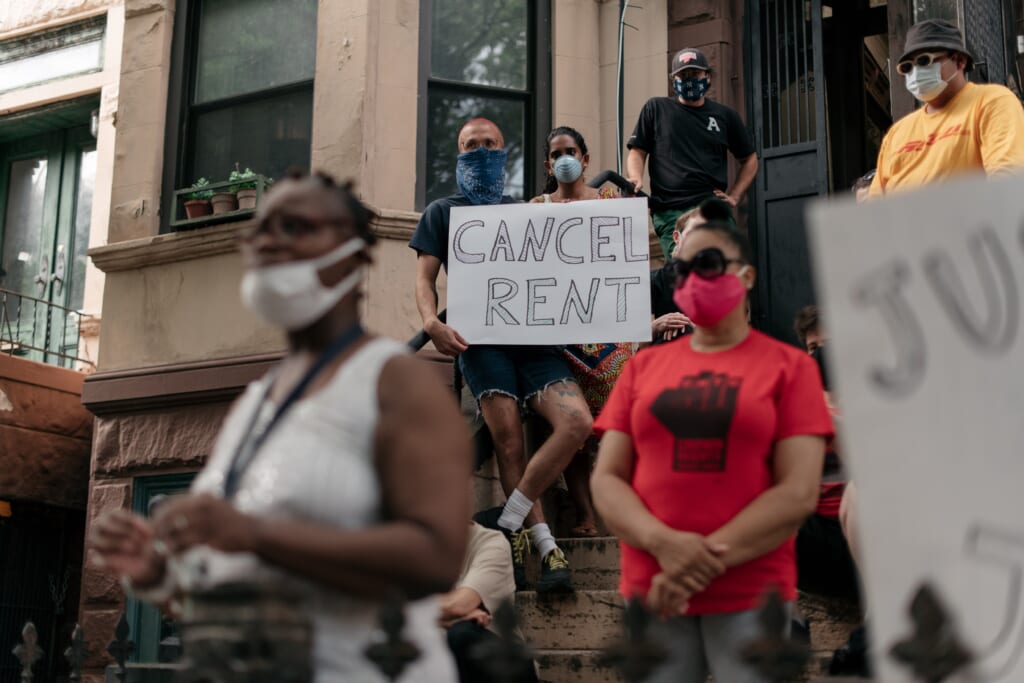Evictions looming for millions in the new year without further protections
Federal moratoriums on evictions will expire at the beginning of the year, but a new bill introduced today may help
The holiday season is supposed to be a time when families gather together to exchange gifts and appreciation. But this year’s holiday season has already been irretrievably altered by the coronavirus pandemic.
There’s even more of a challenge to celebrate for some families as 2020 gives way to a new year – the real fear of homelessness.
Read More: Vaccine comes too late for the 300,000 US dead
According to The Philadelphia Inquirer, millions of Americans will face evictions once federal moratoriums expire at the end of the year. Congress stalled for months on renewing the CARES Act, which would have assisted with extending unemployment benefits and federal eviction protection. What they fail to realize is some people are quickly running out of viable options.
“The longer employment stays suppressed, and people stay out of work, it will make it even harder to catch up on the debt and dig yourself out of that hole,” Davin Reed, community development economic adviser at the Federal Reserve Bank of Philadelphia, told the Inquirer.
In Philadelphia alone, the city processed 1500 evictions a month even before the pandemic. According to the Inquirer, that number is expected to spike 50% higher in 2021.
The city has had some success with an Eviction Diversion program created in response to the pandemic that has brought landlords and tenants a chance to come together to resolve outstanding rent.
However, the outlet reports that after months of complete or reduced employment and the federal subsidy of $600 added to state unemployment checks that ended in July, many families have fallen more than $5000 behind on rent.
When federal protection under the CARES Act ended in July, The Center for Disease Control and Prevention issued a national moratorium on evictions under the Public Health Service Act to stop the spread of the coronavirus in September. But that, as well as state and city protections, ends as of Jan. 1.

According to The Wall Street Journal, this will impact 2.4 to 5 million American households. And they say that renters may owe $70 billion of unpaid rent by Jan. 1.
“I don’t see how it’s possible that we’re not going to see more evictions on Jan. 1 than we’ve ever seen in a month,” John Pollock, a staff attorney at the Public Justice Center told the Journal.
The Census Bureau, per the Journal, finds that those most at risk are African-American and Latino households. A third of Black renters and 18% of Latino renters say they are behind on rent, while just 12% of white renters reported the same.
Without action from Congress, an unprecedented housing crisis will cause a domino effect of evictions as landlords are also behind on mortgage payments. As a result, public utilities are not receiving payments, and city and state tax bases are not receiving the monies that guarantee public services.
And with homeless services already strapped where will people who are evicted go?
“For nine months, this tsunami on the horizon has been completely predictable and entirely preventable; we’ve known the solution to this for months, [the problem] is the lack of political will,” Diane Yentel, president and CEO of the National Low Income Housing Coalition told Vox. “We’ve been saying for nine months now that it’s going take at least $100 billion in rental assistance.”
Some hope is on the horizon though. Just today, after months of negotiation, Congress unveiled a new package – a $908 billion COVID relief package split into two bills that includes rent relief, another round of PPP loans, state and city aid, and funding for vaccine distribution.
Read More: The development of COVID-19 vaccine is not enough to save this nation
“This is hope for those who have been asking their Congress to be responsive to what they’ve seen in the face of the pandemic,” Sen. Lisa Murkowski (R-Alaska) said at a press conference following the announcement.
It does not include a federal stimulus check. Still, it mentions an extension of eviction moratoriums until the end of January 2021 and student loan forbearance until April 2021, as reported by CNBC.
Have you subscribed to theGrio’s podcast “Dear Culture”? Download our newest episodes now!
TheGrio is now on Apple TV, Amazon Fire, and Roku. Download theGrio today!
More About:News

